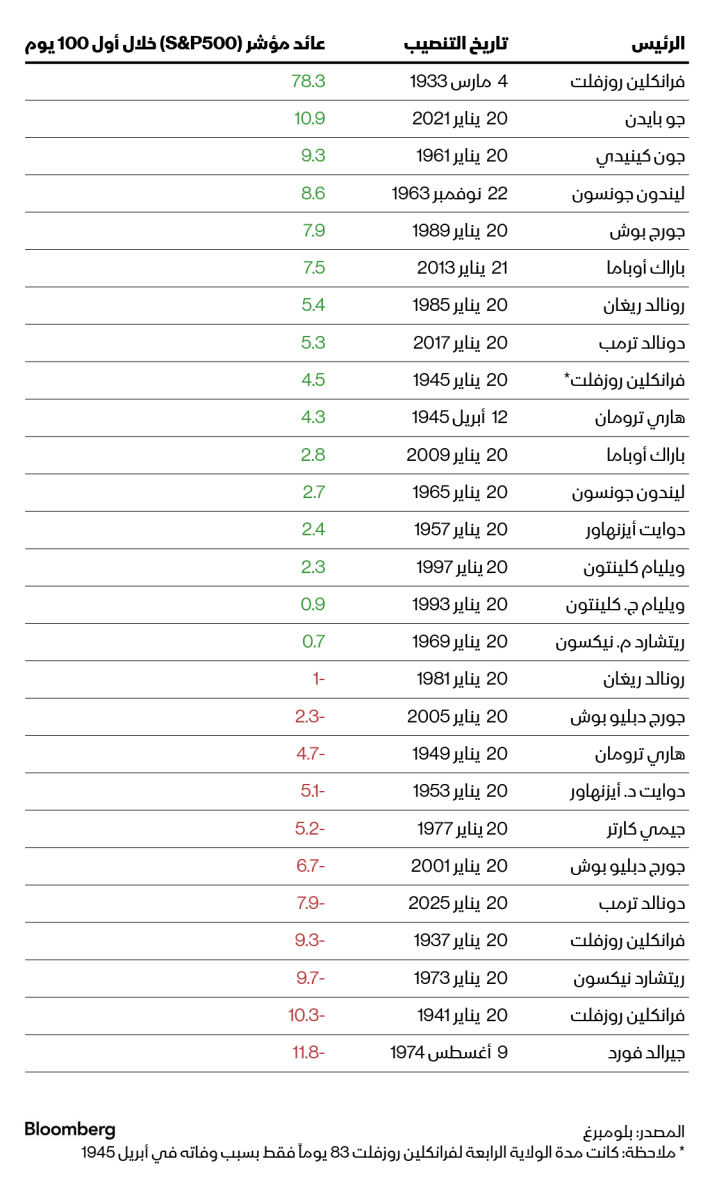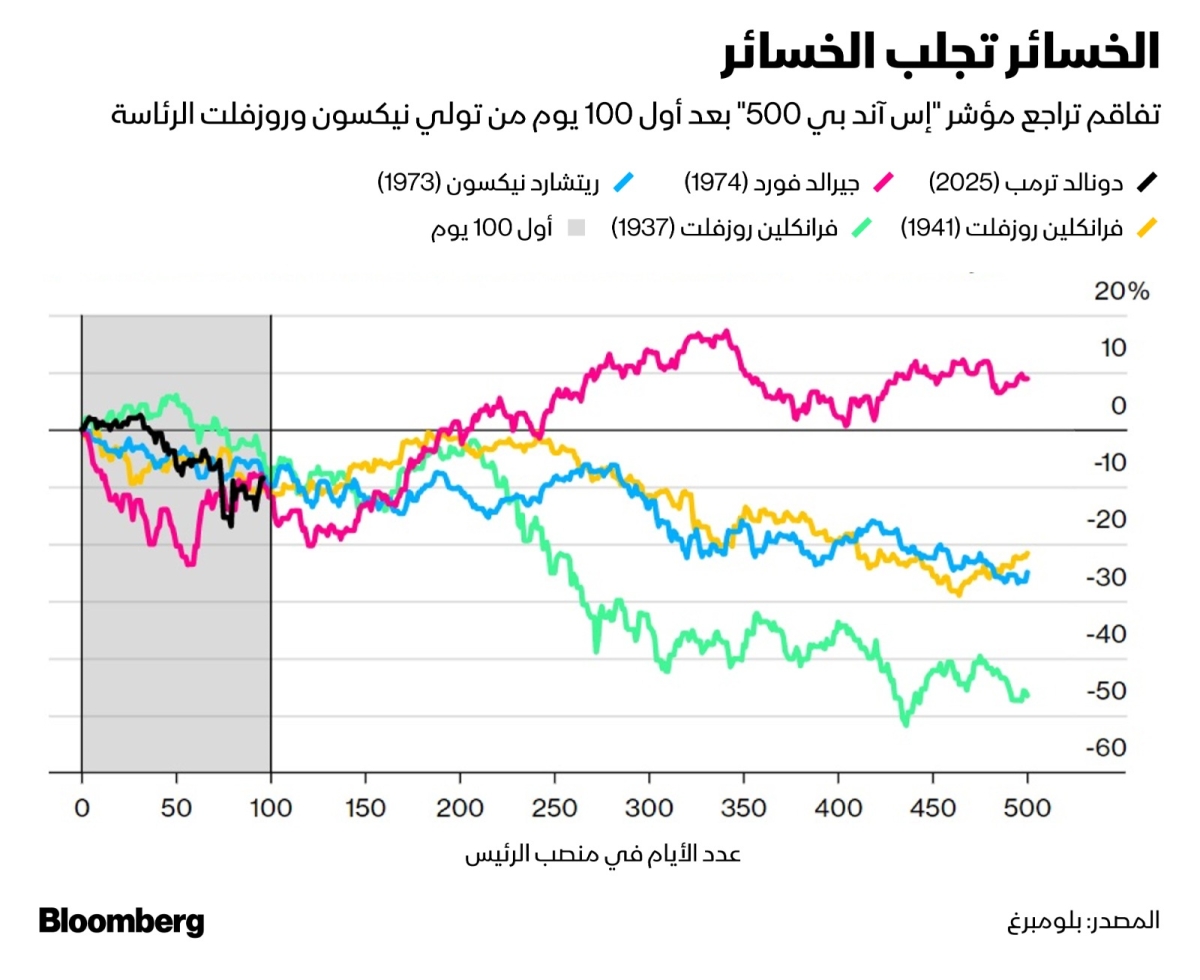The first 100 days of Trump’s presidency .. The boom of the promised markets wished to lose
April 30, 2025
Donald Trump promised the Americans with an “unprecedented boom” if they elected him as president, but based on the performance of the stock market during the first 100 days of his presidency, it has been dependent on the concept of the word “boom”.
The moves were definitely surprising, but they were not as much as investors. By April 30, Trump would have completed his first 100 days in the presidency. Despite the increase of the S & B500 last week, it is still 8% down since Trump’s inauguration and is going to achieve its worst performance during the first 100 -day period of the president since the Gerald Ford in 1974, who took the position after Richard Nixon’s resignation.
This is a sudden change that only a few “Wall Street” analysts expected, two consecutive years of gains exceeding 20%, and an agenda was expected to support growth. Instead, the markets witnessed violent fluctuations after Trump imposed customs duties on almost all countries where American companies operate, then suspended their application on some countries, excluded from them certain sectors, and escalated the trade war with China.
These turmoil, which coincided with the fierce campaign launched by the American administration to deport workers from illegal immigrants and the mass dismissal of federal employees, has sparked the concern of investors, and prompted the S & B 500 index to the entry of the seventh fastest correction phase since 1929.

The stocks are affected by customs duties
“This was a typical example of a severe systematic risk in the clearest picture of it. The volatility is completely different from what we have seen, and spread without discrimination in all sectors and asset groups as a fire in the wild, fueling it constantly by the brief random statements and changing political measures,” according to Mark Malik’s description, the chief investment official of Sieber.
Dealers wagered everything they had on “America First” policy immediately after Trump’s victory in the elections, which led to the achievement of the “S & B500” best performance after the elections ever. The prevailing expectations were that the government would reduce regulatory restrictions and reduce taxes, which would support growth. But the president’s interest focused on his customs war instead, which led to fluctuations in the markets with every new decision to impose customs duties on commercial partners.
Eric Diton, the president and managing director of the company “Wilder Alias”, believes that “the motivation for the election of Trump was (returning greatness to America) and (and that the economy will refresh). But the reality is that all this blurring surrounding trade weakened economic growth.”
S & B 500 decreased more than 10% during the two trading sessions this month after Trump announced on April 2 the highest customs duties imposed by Washington a century ago. Then it rose after a week when the administration changed its course and postponed the definitions for 90 days, and the shares have been recovered since then, but the dealers have difficulty determining the trend of prices.
Shocks follow the stock market
“The shocks continued one by one,” said Dave Lutz, the strategic analyst for the macroeconomic economy at Jones -Trading and veteran expert with 30 years of experience in Wall Street.
Wall Street is also preparing for more shocks; The speculators have increased the net sales centers in the future S&P 500 contracts to the highest level since December, according to the latest data issued by the Justice Commodities Trading Committee on Friday.
The luxury consumer commodities and information technology have led the wave of shares decline since Trump’s inauguration on January 20, while the Diches Out role for shoes, “Tirradin” to make semiconductor production equipment, and Albimarl specialized in chemical production among the largest losers.
While other companies whose shares declined “Tesla” included the electric car maker of Elon Musk, “United Airlines”, “Delta Airlines” and “Norweghen Cruz Line Holdings”.
Consumer commodity and chips makers face the risk of high costs caused by new customs duties, while travel companies are expected to feel pressure as consumers reduce spending if the economy begins to face challenges.
Malik said: “It is an irreplaceable damage. The general trend and momentum are very important in the stock market, and they really reflect the morale of consumer. Unfortunately, the opposite of the path of these two workers after their deterioration quickly is very difficult.”
The stock centers in stocks are still near their lowest level in the historical scope, according to data issued by “Deutsche Bank”, whose strategic analysts reduced last week the expectations of the “S&P 500” this year.
At the same time, strategic analysts at Bank of America warned on Friday that the conditions that support the continuous recovery of the stock market, and encouraged investors to sell shares during the latest wave of rise in American stocks and dollars. Foreign investors have realized this, and they started selling large quantities of American stocks since the beginning of March, according to “Goldman Sachs”.

The blurring tents on the situation
There is a single word used by money managers to summarize Trump’s commercial plans and their impact on the stock market: fog, and Paul Nolt, the strategic analyst for the market and the first manager of wealth at Murphy & Slevet Wildetle Management, said: “We still do not know what we seek to achieve with Vietnam, Canada or Europe, and we have no idea what will be considered success.”
The lack of a clear vision prompted investors to turn into a defensive strategy, beware of misleading signals, and prefer to monitor the situation until more concrete details appear about politics. But this is not the only danger.
“We must go beyond the fog that surrounds the commercial policy, as it disrupts companies’ plans for capitalist spending and employment, and may also lead to a reduction in consumer spending,” said Eric Stroner, the chief investment official of Apollon Wilth.
David Levcowitz, American stock manager at the UBS wealth management arm, believes that slowing the economic activity caused by customs duties, as well as the high costs associated with that, will reduce profit growth, and expect the profit of the profits of the companies listed on the S & P500 unchanged this year.
Corporate profits are affected by recession concerns
The profits of the first quarter show the duration of the fog crisis facing American companies with the same extent. There are companies that give up the directives of their financial results, reduce profit expectations, and resort to unfamiliar solutions to deal with fluctuations. For example, United Airlines released two groups of profit expectations, the first if the situation continues, and the other if the economy enters a stagnation stage.
In this context, Malik from “Sepert” says that “given the stagnation cases, they start from companies when they stop employment, then begin to dismiss the employees, and then stop spending.” Although he is looking for investment opportunities in high -quality growth shares whose prices have decreased, he added that he was bought with caution and careful.
The latest poll conducted by “Bloomberg” for economists’ opinions showed that analysts expect the trade war to affect economic growth in the current and next years, in light of the high prices and the impact of consumer spending.
Where are the investment opportunities in the market?
Jim Warden, the chief investment official of “Wildth Conseling Group”, is looking at the shares of health care companies, financial services, and consumer goods, as well as shares that have been exposed to a significant decrease without justification during the heavy sales wave.
At the same time, James Abit, director of the basic data analysis strategies for “Horizon Investments”, revealed that the company accepts the purchase of regional bank shares, and that “the current environment is not favorable to deal in the index, but it may represent an opportunity for active investment managers to prove their worth.”
Nevertheless, “Wall Street” deals with the stock market with a degree of caution, despite everything, no one knows what the hundred will carry the next day, and Diton said from “Wildera Alians”: “We have not exceeded the crisis yet, and I do not expect that we can overcome it soon,” and concluded: “Trump behaves with his nature that we have entrusted.”